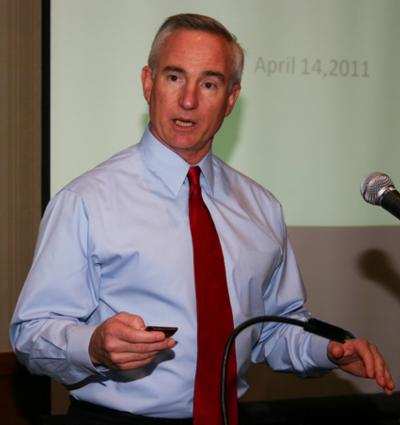ALPA Testimony Before U.S. House Aviation Subcommittee Refutes Alleged Pilot Shortage
Capt. Lee Moak, president of the Air Line Pilots Association, Int’l (ALPA) underscored in testimony before the U.S. House Aviation Subcommittee the serious economic threat to U.S. airlines posed by state-supported foreign airlines and foreign airlines’ business plans that conflict with U.S. policy. He reinforced ALPA’s call for the U.S. government to make certain U.S. airlines have an opportunity to compete and prevail internationally.

The economic threat to U.S. airlines is very real,” said Capt. Moak (pictured) at the hearing, which was titled “Air Service to Small and Rural Communities” and included discussion of the Essential Air Service (EAS) program through which the U.S. government pays participating airlines to serve small and rural communities. ALPA maintains that, if U.S. airlines are not able to compete economically, there may be little need to discuss small and rural air service in this country. “The most serious challenge faced by this sector is one that threatens the entire U.S. airline industry,” he charged.
During the hearing, Capt. Moak also made clear ALPA’s position that there is not a shortage of qualified pilots in this country. “There is, however, a pay and benefits shortage for qualified pilots,” he said.
Explaining that the average beginning pay at a U.S. regional airline is about $24,000, Capt. Moak detailed ALPA’s involvement on aviation university campuses and stated that some new pilots are turning to other careers because they cannot earn a living flying for a regional airline. He also noted that thousands of experienced U.S. airline pilots are currently flying for foreign airlines when they would rather live and work in the United States, were they offered competitive market-based pay and benefits.
“A number of EAS airlines have been vocal about an alleged pilot shortage,” said Capt. Moak. “It is wrong for an airline that receives millions in federal EAS dollars to offer such poor wages and benefits that it cannot attract pilots and then use this inadequacy as an excuse to drop service to EAS communities.”
In addition, ALPA’s president denounced certain U.S. airlines that are attempting to use a contrived pilot shortage as an excuse to roll back the safety gains realized with the new pilot fatigue rule and first officer qualification requirements. “The new safety requirements were developed with input from industry, labor, and government,” said Capt. Moak. “The Regional Airline Association was co-chair of the Federal Aviation Administration’s First Officer Qualifications Aviation Rulemaking Committee and the airlines have had years to prepare for their implementation.”
In its testimony, ALPA called for:
- Congress to examine with the Department of Transportation the government’s relationship with regional airlines that accept millions of dollars under its EAS program while offering wages so low they cannot fill their pilot seats.
- Congress to restore loan guarantees for college and university flight students and work with the airlines to offset pilots’ flight training expenses.
- The U.S. government to ensure that the U.S. airline industry does business on a level playing field that allows U.S. airlines to compete and prevail internationally by, among other actions, limiting inappropriate regulations and reducing airline taxes.
“Stronger U.S. airlines mean better profits, more flights for small communities, and improved wages and benefits to attract and retain qualified airline pilots,” Capt. Moak concluded.
 USCG MH-60 To The Rescue (Again) -- Rescues 4 Boaters
USCG MH-60 To The Rescue (Again) -- Rescues 4 Boaters Gray Eagle Order Placed for Army National Guard
Gray Eagle Order Placed for Army National Guard Aero-Biz Survival 101 (1120a): Expert Ideas To Help You Through Tough Times
Aero-Biz Survival 101 (1120a): Expert Ideas To Help You Through Tough Times Airborne 06.03.24: Rotax 915/916 SB, Starship 4 Ready?, B-17 Mementos
Airborne 06.03.24: Rotax 915/916 SB, Starship 4 Ready?, B-17 Mementos Mid-Continent Instruments and Avionics Mourns Former Leader
Mid-Continent Instruments and Avionics Mourns Former Leader



